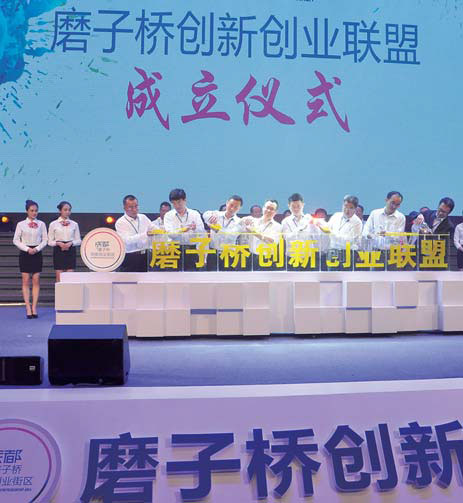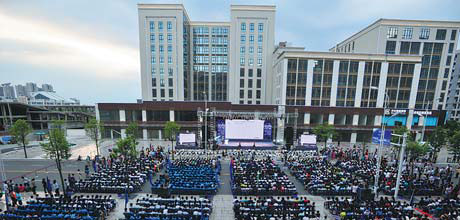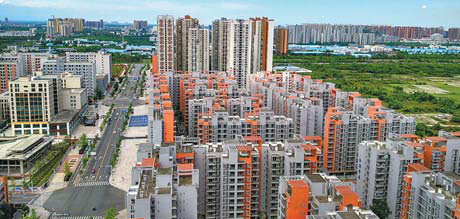Innovation hub attracts international entrepreneurs

Representatives of universities and businesses in Chengdu attend the opening ceremony of the Moziqiao Innovation and Entrepreneurship Area.

Activities under the brand name of "Venture Tianfu-Jingronghui" are held in the city's Pixian county.

Chengdu is building Deyuan town in Pixian county into an "entrepreneurial town".
Moziqiao Innovation and Entrepreneurship Area is becoming a landmark for grassroots entrepreneurs in Chengdu, the capital of Sichuan province.
The area was opened on Oct 21, after finishing construction on its first batch of office buildings and support facilities that occupy an area of about 20,000 square meters. It is expected to attract 20,000 people to start new businesses by 2025.
With Moziqiao Square as its center, the area covers several universities and research institutions and has dedicated sections for international businesses, startup incubation and innovation demonstration.
The area has established a strategic partnership with its Beijing counterpart, the Zhongguancun Science Park, to cooperate and exchange experiences on corporate management, service philosophies and operation models. It also encourages Zhongguancun startups to locate projects there.
Currently, the area is home to several global names, including Infinity Group, an Israel-headquartered firm dedicated to cross-border fund management.
"We chose Moziqiao because it has an obvious geographical superiority. The area has rich educational and human resources, as well as a profound entrepreneurial and innovation environment," said Zhang Xiaodong, the company's chief investment officer in Sichuan.
Infinity plans to build a 2,000-sq-m incubator in the area and set up an investment fund for strategic emerging industries in the city's Wisdom Valley, he said.
As another innovation and entrepreneurship cluster in Chengdu, the valley plays the role of an industrial accelerator to help science and technology companies further develop after incubation. Libraries of nearby colleges are open to the public and their labs will also be available for companies in the future.
The valley has signed cooperation agreements with 16 universities and research institutes in the province.
Chengdu also boasts Jingrong town, an "entrepreneurial town", in Pixian county.
Deyuan town used to have agriculture as its pillar industry and last year there were 1.2 million sq m of empty buildings in the town.
To use some of the buildings and transform the local economic development model, the county government launched a series of preferential and supportive policies in March to transform Deyuan into an innovation and entrepreneurship town for local college and university students.
The town has three special bus lines serving 250,000 students in 19 higher education institutions in the county, such as colleges and training schools.
It also built a 240,000-sq-m industrial park, attracting 12 incubators and about 230 startups.
The Optics Valley Startup Caf, founded by Xiaomi's CEO Lei Jun, opened in the town in April. It has become a gathering location for venture capital investors and young people who want to start their own businesses. The cafe provides professional services from venture capital firms for young entrepreneurs.
"Business incubation platforms like the cafe have brought in international visions, as well as capital and ideas from Beijing, Shanghai and Guangzhou," said Wang Donglin, director of Sursen Corp, a leading information security product and service provider.
The county government set aside an annual fund of more than 50 million yuan ($7.84 million) for startups.
Yang Xiangji, CEO of Tap4Fun, a mobile game company in Chengdu Tianfu Software Park, said although Chengdu could not be compared to the United Sates in terms of entrepreneurial environment, it has, in his opinion, already overtaken some of the best European cities such as London, Paris and Berlin.
"Europe now has high barriers to start a new business, so most of the young people are willing to find jobs in large and matured companies. In Chengdu, young entrepreneurs are very passionate," Yang said.
Charlie Moseley, a US game designer at Tap4Fun went to Chengdu nearly 10 years ago at the invitation of one of his friends. He initially planned to stay for a few months, but now he said he has no timetable for leaving.
Wang Tun, who returned from the US where he got his PhD, established a high-tech company dedicated to developing earthquake early warning products.
"The Chengdu high-tech zone provided me with 250 sq m of office space with very low rent, and also four times offered financial support when the company had a lack of money," Wang said.
"If you have good ideas, the government will help you to achieve them," he added.
haonan@chinadaily.com.cn
(China Daily 11/18/2015 page24)



